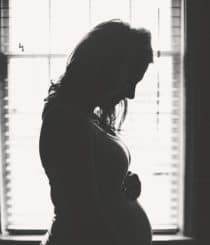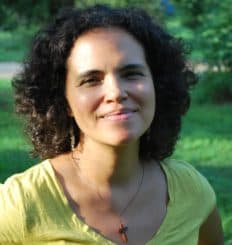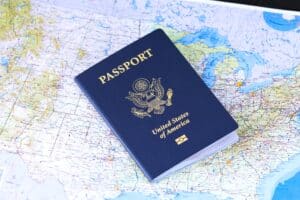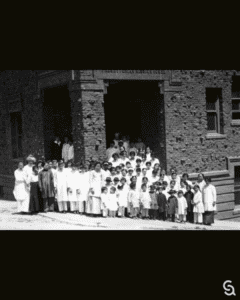A two-part interview with two sisters who recently immigrated to the United States

“I want my daughter to be somebody, to surpass me, to have a better future and a better life than mine.”
Yasmin* sits up from the couch and rubs her belly. She had dozed while her older sister, Elena, had told me her story about immigrating to the United States. I ask Yasmin if she wants to keep napping, or talk about her journey. She says she wants to speak and begins by naming the hopes she carries for her daughter, hopes that led her to ride like cargo in the back of a tractor-trailer, and to run through thorns on cold desert nights without food or water. She piled onto an airboat that crossed the Rio Grande and made it safely to the other shore. “Gracias a Dios,” she sighs, “we made it.”
At the time of our interview, Yasmin is 19 years old and due to deliver her baby soon. It is about one month from when she was picked up by ICE at the end of her perilous journey into the United States. When I ask her to describe the detention center where she was kept, she says she still hears the sounds of mothers and fathers crying for their children and children crying for their parents. She thanks God that her child was still safe inside of her while she was detained.
Yasmin slept in a cold, windowless warehouse, exhausted and hungry. The constant glow of fluorescent lights made her unable to tell the difference between night and day. Wrapped in a blanket that she described to me as a piece of aluminum foil, she fell asleep to the sound of people crying. Yasmin has a genetic condition that causes liver problems during pregnancy, as well as a rash and high fever. Thankfully, she and her child survived their grueling days in detention.
Why would a pregnant teenager put herself and her unborn child in so much danger to cross multiple national borders without papers? For Yasmin, there is no question that this was the best choice for her and her baby. As she recalls the forces in her home country that pushed her to start this journey she sighed, “So many bad things happened that scared me very much.” Yasmin ran a small business in her home country, when gangs began to take control of her neighborhood. They insisted on her paying them a cut of her profits. The extortion was making it impossible to maintain the business. She got to know a young man who “made her pregnant,” as she says. She did not know that he was part of the gangs that were taking over her community.
With her business profits shrinking, she had no way to support the child. The child’s father insisted that she get an abortion. She refused. Then he told her to have the baby, so that he could sell it. When Yasmin told me this, I repeated the phrase back to her to be sure I understood her correctly. “Yes,” she said in Spanish, “he wanted to sell his own child.” When she refused to comply with his demands, he threatened to kill her and his unborn child. “I was afraid, and so I left,” she says. Yasmin insists that our current administration’s tough stance against immigration did not deter her from what was a life or death choice. “People will find a way to survive, we have no other options.”
Yasmin insists that our current administration’s tough stance against immigration did not deter her from what was a life or death choice. “People will find a way to survive, we have no other options.”
Elena was surprised when she got a call that her sister was being detained in Texas, because she didn’t even know that she had left their home country. Elena received a call from the detention center asking if she would wire them money to pay for Yasmin’s bus ticket to reconnect with her. When an officer called Yasmin from the room with other immigrants, Yasmin says she was terrified that she would be deported. Immigration officers had gathered her with a handful of other pregnant women into a room with a sign that said “deportation.” One of the women began to cry and pray, “Lord it is your will. If we go back or stay, our lives are in your hands.”
Then an officer walked into the room and presented the women with bus tickets, paid for by family members who agreed to take them in and honor their court dates. Immigration officers drove the women to the bus station, where they spent the night and waited for the buses to take them in the morning to various destinations across the United States. The women were warned not to go with anyone, as human traffickers sometimes posed as people offering to help immigrants.
“Lord it is your will. If we go back or stay, our lives are in your hands.”
Every phrase in my interview with Yasmin was peppered with “Gracias a Dios.” “Gracias a Dios,” they made it through the night in the bus station without being kidnapped by traffickers. “Gracias a Dios,” my sister sent me a ticket. “Gracias a Dios,” I have food, clean water, a place to take a shower. “Gracias a Dios,” my daughter will be born in safety and have a better life than me. Now Elena is working not only to support herself and her own young daughter, but her sister and her young infant as well. In addition to all the regular expenses of daily life with young children, they are working to pay thousands of dollars in legal fees in hopes that an immigration lawyer can help make a case for them to have a legal path toward citizenship in the United States.
I felt bad asking this question, but I knew that some readers might wonder, even after reading their stories: They broke the law to come here. Why not come here the “right” way? Elena spoke up. She reads the Bible every day; she says it shapes her choices and her world view. She fully agrees that we should strive to follow the law. But Elena and Yasmin were living in a place in which the laws are not protecting human rights, especially the rights of women. “It’s not like we said, ‘Oh we want to break the law,’” Elena said. “We knew that the US government would not give us an opportunity to come here legally. But we had to make a choice so that we could survive.”
As racist, ignorant and fearful rhetoric continues to pour forth from people claiming to follow Jesus, I urge you to listen instead to the still, small voices of these sisters in Christ, the voices of those with their “backs against the wall.” Elena concluded, “I just want people to know, every immigrant has their own experience. Some of us come through the desert, some of us cross the Rio Bravo, we are all risking our lives to come to the US and now that we are here, the suffering continues. It is hard to live here undocumented. This is what we do to survive.”
Elena and Yasmin and countless others like them want their sisters and brothers in Christ to pray for them, and work toward solutions in which all people can not only survive, but thrive.
* Names and identifying details have been changed in order to protect their privacy and their immigration cases.
 Josina Guess is a writer and faith leader based in rural Georgia, where she lives on four acres with her husband and their four children. Her writing has appeared in Sojourners, The Christian Century, several websites and an essay forthcoming in Fourth Genre. She posts thoughts and poems on things like family, race, gardening, and cooking at Josina’s Kitchen Table.
Josina Guess is a writer and faith leader based in rural Georgia, where she lives on four acres with her husband and their four children. Her writing has appeared in Sojourners, The Christian Century, several websites and an essay forthcoming in Fourth Genre. She posts thoughts and poems on things like family, race, gardening, and cooking at Josina’s Kitchen Table.


